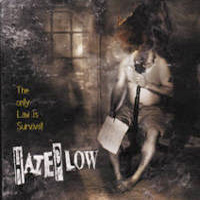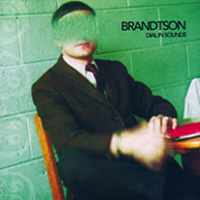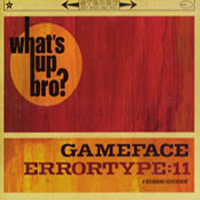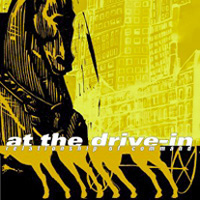 At the Drive-In
At the Drive-In
Relationship of Command (Grand Royal)
An interview with vocalist Cedric Bixler
by Tim Den
Already a mythical and legendary band thanks to their over-the-top live shows, El Paso, Texas’ At The Drive-In have put in their years on the road to get where they are today. After six years of releasing independent albums (a lot of them by themselves), non-stop touring, changing members, and developing one of post-hardcore’s most loyal followings, they’ve released their most mature, expansive, and overall best album to date: with Beastie Boys’ own Grand Royal, no less. Relationship of Command is one continuous exorcism, with famed producer Ross Robinson pulling every ounce of strength out of the band’s already insanely energetic identity. The result is eleven tracks of flawless (read: flawless. Not one bad track or weak spot) emotional outburst, sometimes calling for melodies, sometimes calling for screams so urgent it could only come from the deepest corners of the subconscious. This album jumps out of the stereo and chokes your nerves. It’s that intense.
Compositionally, this is a rare occasion where “that one good riff” or “that one good idea” isn’t fleshed out into songs by having mediocre parts added to it. Instead, every element, every segway has its own distinct flavor, and every riff is connected to the next as if they organically grew out of each other. This gives all the songs on Relationship of Command a non-obtuse feel like no other; as if every second is integral. Direction-wise, it’s everything the fans have come to expect of these guys: unusual noises culminating in sporadic guitar punctuations, strange notes combined with heavy percussion, and punk rock fundamentals coming together like a rocket spear. Of course, it doesn’t hurt that the album (especially the sick, sick bass sound) has drill hammer production. Get this now to experience one of the most original bands today.
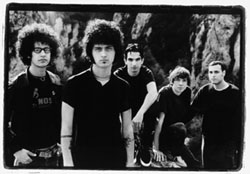 What happened with Den Music, the label Relationship of Command was supposed to come out on?
What happened with Den Music, the label Relationship of Command was supposed to come out on?
It just went bankrupt. While we were recording, we got a call that said we were dropped. Right after, they said we were on Grand Royal. Mike D had heard some of our older stuff and wanted to distribute it in Europe, so we were cool with that. It ended up that Capitol’s contract ran out with Grand Royal, so they were on their own. The people who run the music division, John Silver and Gary Gersh – they manage Beastie Boys and Foo Fighters – joined forces with Mike D and the rest of Beastie Boys… and it worked out really well.
How did they initially hear you?
They were listening to Vaya and In/Casino/Out, and Mike D was in the office. John and Gary played it for him and said “This is what we’re working on right now,” and he liked it. I was stoked on that. After all that happened – after we were kind of officially on Grand Royal – he came to a show at the Troubadour in L.A. and hung out. Since then, we got the offers for the Beastie Boys/Rage Against The Machine tour. They had to postpone because he underwent surgery, but he’s okay now. I’m kinda glad, because it’s a little hard playing for those kinds of crowds. But it’s necessary.
You got a taste of “those kinds of crowds” when you opened for Rage Against The Machine on a few dates about half a year ago. How was the response?
They tended to be a little harsh. A lot of younger people… I’m not dissing on age or anything, but they wanted to go there and just see Rage. It’s understandable. But we were there trying to do our thing, representing where we’re from, which is underground shows like this (points around T.T. the Bear’s). And if we could show kids out there that there’s something else going on besides what’s on TV, then that’s our mission… however romantically stupid that sounds. We had some kids come out to Long Island who saw us at Nassau Coliseum, and they had no clue that there’s a scene “out there.” They don’t know about this (points to his copy of Lollipop). They come out to a bowling alley, they’re bowling next to us, and they’re tripping out because bands they listen to don’t go out and talk to kids at a show. We sat down and wrote lists of bands for them to check out. For us, the band, it’s a real hands-on, grassroots thing.
Seeing as you’ve now got your feet in both the mainstream, major label world and the indie scene, who do you consider peers?
The Murder City Devils. We’re going on tour with them next month, and we have a split with them coming out, too. It’ll be hip-hop/jungle/ drum’n’bass remixes of our older stuff. They’re our brother band. There’s also Sunshine from the Czech Republic, and …And You Will Know Us By The Trail Of Dead from Austin, Texas, and Les Savy Fav from New York. They went to the same school that Talking Heads went to, so they’ve got this really good ethic and approach to their music. Little bit of The Pixies, Fugazi… almost a bit of Talking Heads, too. I see those bands as our contemporaries, really, because they do the same things we do. They do independent records on their own, which is where we come from. We never had the chance to come out of a nice, big scene like DC/Dischord or Lookout! in California, we had to do it on our own. And most of those bands I mentioned – like Sunshine and The Murder City Devils – dealt with putting out their own albums and booking their own tours. That’s why I know those are our brothers and sisters.
 Tell me about “where you come from”: the infamous El Paso, TX.
Tell me about “where you come from”: the infamous El Paso, TX.
It’s definitely a love/hate relationship. We had a lot to do with booking shows there, trying to maintain a scene, seeing kids come and go… it’s a big city. It’s bigger than Austin. But we’re a big city with a small town mentality. Austin’s more of a college town, but we have colleges too. But the shit that’s really big in El Paso is Tex Mex music. That’s obvious because we’re a border town. But you have kids coming over from Guatas, Mexico going to shows, and it makes you wonder why so many bands pass it up. Between Austin and Phoenix, where are you going to play? Do you really want to drive that far? It’s a pretty impossible drive: I hate it. From Austin to El Paso is about ten hours, add another six or seven to Phoenix… so you really should stop and play El Paso. But people don’t because it’s not a good turnout. If we were to play or The Murder City Devils played, kids would come out, but other times, kids stay outside the show drinking. It happens everywhere, but in El Paso… I definitely see the apathy.
Every generation – the seniors in high school – leave for Austin. So you have to deal with teaching seventh and eighth graders the ethics of a punk show and everything else all over again. It got really old and tiring. All the old punks left… We had The Rhythm Picks from El Paso: they’d book bands like Crimpshrine and Black Flag way back when. We grew up watching them, picked up where they left off, but I got tired of it myself. It’s not that rewarding when I’m embarrassed to tell a band “You know what? It’s not gonna be a good show, I’m sorry.” My friends are involved with Food Not Bombs; we put on shows, we put bands up, we start our own printing presses to do our own records and ‘zines… It just sucks having to start fresh every year. So I left. I live in Long Beach, but Jim (guitar/keyboards/vocals) still lives there. He’s starting his own label, Restart, and the first singles are gonna be all our old reissues and the new One Armed Scissor EP, although we’re still trying to get this one CD, El Gran Orgo, back from OneFoot Records. The guy (who originally released it) sold it without our say-so. Omar (guitar/backup vocals) and I have a dub group called De Facto that’s on Restart too. So yeah… El Paso’s a little weird.
The indie scene is no less fickle or fad-oriented than the mainstream. Everyone thinks they’re rockstars just because they have a local following, sell a handful of records, but they have no impact on the rest of the world, or music in general. And when they think one thing’s not “cool” anymore, they leave for something else…
I totally know what you mean. I get a little tired of “hometown heroes” too. They end up booking (all) the shows and having this snooty attitude. It becomes everything in high school that you joined this underground to get away from. High school all over again. It’s frustrating. I hate seeing that. But that’s what we try to do: battle all that snootiness. Although we could stay in El Paso and be known as “Oh they’re At The Drive-In. They book shows. Better kiss their asses,” I don’t want to do that. I want to travel the world and communicate ideas with different kids in Germany, Poland, everywhere.
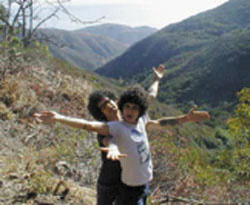 But I’m sure the hometown has given you a backlash. “They left us because they’re big now…”
But I’m sure the hometown has given you a backlash. “They left us because they’re big now…”
We’ve gotten a lot of criticism. When we were doing records for Flipside, we showed up to play with Boy’s Life at a garage. We had equipment that we’d bought with money working shitty jobs, and people were like “Oh, they’re big time now, they have equipment.” They were homemade cases… These kids live with mom and dad and get an allowance, whereas we work shitty jobs to do this for a living. They don’t understand. They’ll never understand. We’ve spent weeks in Philadelphia with no shows, living on two bucks a day. We’ve seen horrible things. We’ve seen people get killed outside of shows. We’ve seen crazy shit just to do what we want to do. Yet here you have some snooty kid wanting to put these rules on us, and it’s like “Shut up, man.”
You’re one of the only prominent Latino bands working the underground scene. What’s your family like and how does your Hispanic heritage play into the band?
Well, you had Los Crudos for a while, but they broke up… My family is bilingual. My dad teaches bilingual education in El Paso. His dad was German; that’s why I have colored eyes and lighter skin. My dad’s mom’s Spanish – as in people from Spain – so she had red hair and spoke proper Spanish (Castellano). My Spanish is more lingo – Spanglish, basically. Bordertown Spanish. But my mom is total dark-skinned Mexican. Omar was born in Puerto Rico. His dad has total influence over the band. He’d come to our practices, yelling at us “This is the song, you guys… I love it!” He played percussion on two of our records. He’s awesome. He’s helped us through some heavy times, financially and otherwise. We’ve paid him back with the tours, so it wasn’t like “papa moneybag” floatin’ the band. He understood that we had a work ethic, and he liked the music too.
Tell me about growing up Chicano.
On the new record we have a song about it called “Quarantine.” A couple high schools next to the Rio Grande – one called Bowie High – close to the border, the kids who go there get hassled by the Border Patrol left and right who don’t realize that (the kids) are just going to high school and not crossing illegally. The reason why the song’s called “Quarantine” is because I see these maids working for nothing, risking their lives to come over. They’re treated like nothing; like germs and diseases. Going over to Guatas to drink and shit when you’re younger, you see a lot of fucked up shit. I come from this nice suburb, but I get on the roof of my house and I can see the shantytowns with cardboard houses. It’s black and white. I see what it’s like being Mexican-American. I worked at a carwash one time, and because I’m lighter skinned, the pure Mexicans treated me like shit until I spoke Spanish. So you see how everyone’s biased now… To be Chicano, to me, is not being accepted by your blood or the “Americans” either. You’re in the middle. And being a part of punk makes you even more independent: “Who’s this freak? Oh, you speak Spanish? But you have pink hair? Look at the way he dresses! We (Mexicans) don’t like ’em, no one (mainstream society) likes ’em.”
What music do you listen to?
Omar’s dad’s taste in ’70s salsa effects us a lot. Jim’s really into country stuff – Johnny Cash, Hank Williams (Texas: can’t escape it). I like a lot of drum’n’bass, and I just love old roots reggae dub. A little of that comes off in our newer songs. Sometimes when we play Tito Puente in the van – even though it’s more Puerto Rican than Mexican – our bass player will be like “Dude, not too much of this. I feel like I’m at my mom’s get-together.”
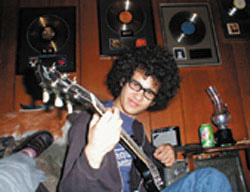 Ross Robinson is known for being a motivational drill sergeant. How did you hook up with him and how was the creative process?
Ross Robinson is known for being a motivational drill sergeant. How did you hook up with him and how was the creative process?
The label wanted him to do some band they were working with. He went to a meeting and somebody was supposedly blasting us – they always blast music at Grand Royal – he walked out of the meeting and was like “Who’s this? Fuck the other stuff, I want to do this!” We’d heard about him and we were like, “Ugh, he’s done Korn. That’s not our cup of tea,” which was really close-minded of us… But he came to a show of ours with The Get Up Kids, and (after the show) we were unloading off the side and he’s going “Man, you guys!!!” (waving arms excitedly, in a metalgeek kinda way) Just really up in our face… We laughed about it afterwards. Then they (the label) told us “know what… after you go tour, how ’bout we give you some free studio time, try him out?” We said why not.
This band has always been about opening your mind… We tried him out and it was really, really good. We totally connected. I’ve never worked with anybody like that, a total therapy session. We all opened up to each other. It was the first time I’ve had to explain the lyrics point-blank to a band member. Like standing naked in front of each other; seeing each other for what they really are. He was like “I’ve seen you guys play. I don’t want you to hold back. I don’t want you to worry about budget, I don’t want you to worry about breaking anything.” He was throwing shit at us, throwing water around the room, breaking stuff, grabbing us and screaming, cheerleading type o’ work… Seven weeks of that. It was really torturous. There’s only so many times I can explain something or how it makes me feel. We were literally bleeding, sweating, or crying coming out of sessions. He knows how to pull it out of you. He kept pushing my buttons ’til he got the right take, the right performance. I woke up one morning and he was driving his car around the studio doing wheelies with our bass player to get him ready for his tracks. It worked.
www.grandroyal.com/atdi

